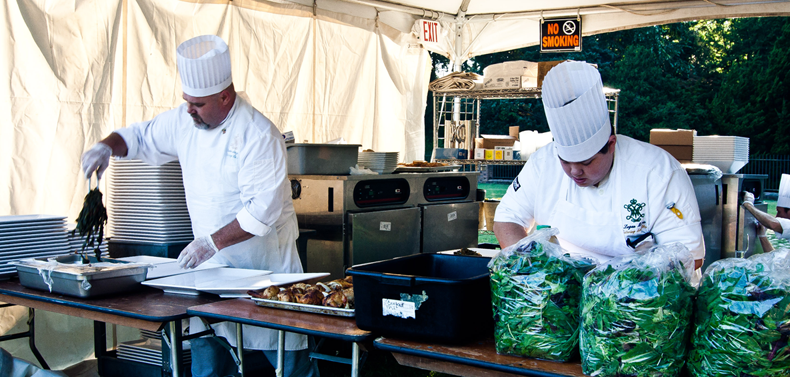Environmental protection and sustainability efforts at the College of William and Mary have become fairly mainstream over the past few years. Students see signs in the dining halls advertising that some of the produce used by Dining Services comes from family farms within a 250-mile radius of the school. Another display of the College’s movement toward embracing sustainability was the Farm to Fork dinner, which took place Friday on the Sunken Garden and featured locally produced foods.
Many students have responded enthusiastically to the administration’s movement for sustainability. Attendance at the Farm to Fork dinner was at full capacity and many students showed support for local and sustainable agriculture.
Moey Fox ’13, who attended the dinner, believes that sustainable agriculture is a great way to produce food for numerous reasons.
“Local produce is great for the small businesses in our local community,” Fox said. “Also, local agriculture cuts out waste and reduces emissions caused by the transportation process. I also support it because of the more humane treatment of animals.”
Laura Claggett ’13, who also attended the dinner, first began to realize the importance of sustainable agriculture when she studied in Italy, where locally grown food is more common.
“In Italy I realized that I could taste the difference between fresh, locally produced food that I had there and the food from large-scale farms back home,” she said.
Larry Smith, director of the Commons Dining Hall, had the idea of developing the Farm to Fork dinner to advance the College’s ongoing move toward sustainability.
“We are progressing with local produce,” he said. “Right now at our dining halls up to 35 percent of our produce is grown locally.”
One example of local produce that can be found in the dining halls is Barry’s Berries and Jan’s Jams from Rose Tree Hill Farm, located in Charles City County. Barry Fitzgerald operates this farm, which supplies jelly and jam for Dining Services.
“We don’t use pesticides or herbicides on our berries,” Fitzgerald said. “It’s ethical and healthier to farm sustainably and organically.”
Barry Patton of Shiloh Acre farms in Ivor, Va., supplied the chicken for the Farm to Fork dinner. Patton raises pasture-fed livestock without using antibiotics or hormones. He feels that he is being responsible by treating his animals humanely.
“Chickens were raised to walk in the pasture and scratch for food,” Patton said. “Chickens were not made to sit indoors next to each other.”
For some farmers, sustainable agriculture is a radical change in routine. However, this is not the case for Marlene McKenzie, an air traffic controller and hobby farmer whose father was a sustainable farmer. McKenzie operates Evergreen Springs Farm in New Kent County. She said that eating fresh, well-produced food greatly benefits health.
“Eating fresh food extends the life,” McKenzie said. “My father was a farmer who grew up eating quality food. He is now 90 years old and is in great shape.”
Every Saturday morning in Merchants Square there is a wide variety of fresh and local produce at the Williamsburg Farmers Market. Located right across the street from campus, this market was named the best in Virginia and third best in the country by American Farmlands Trust.
While there are clearly many advocates for sustainability at the College, buying locally grown food is not a one-sided issue. One common complaint about sustainably produced food is the extra cost. Executive Chef Denis Callinan of Dining Services understands the importance of sustainability, but realizes that it can become an expensive endeavor.
“I could buy the same amount of steak at the supermarket for what I paid for the organic field greens used for the salad at the Farm to Fork dinner,” he said.
However, Callinan appreciates working with fresh, high-quality ingredients.
“Everything is seasonally based,” Callinan said. “Seasonality brings freshness, but it requires us chefs to balance what ingredients we are using when we are creating our menus. We find that making everything from scratch helps in this process.”
McKenzie feels that the public should be more concerned with where their food comes from and how it is produced. Although she understands that there is still a long way to go in reforming American agriculture, McKenzie believes people are starting to understand the significance of what they eat.
“People are slowly getting educated,” McKenzie said. “The customers enjoy the personal experience they get with local food, and that also helps spread awareness.”


Buying/eating local is a great idea. Food tastes better, and is more nutritious. Thanks for writing about this.
This is a great idea!!! I’ll come more often =)